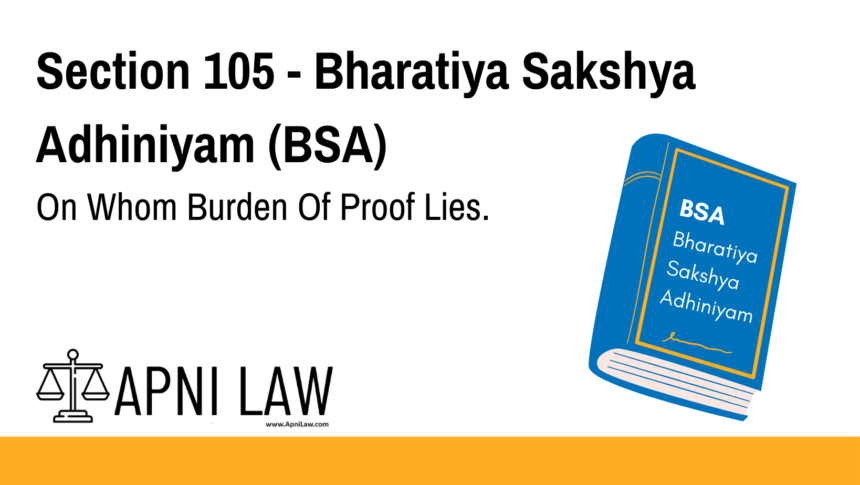Code: Section 105 Bharatiya Sakshya Adhiniyam, 2023
The burden of proof in a suit or proceeding lies on that person who would fail if
no evidence at all were given on either side.
Illustrations.
(a) A sues B for land of which B is in possession, and which, as A asserts, was left to
A by the will of C, B’s father. If no evidence were given on either side, B would be entitled to
retain his possession. Therefore, the burden of proof is on A.
(b) A sues B for money due on a bond. The execution of the bond is admitted, but B
says that it was obtained by fraud, which A denies. If no evidence were given on either side,
A would succeed, as the bond is not disputed and the fraud is not proved. Therefore, the
burden of proof is on B.
Explanation of Section 105 BSA
Section 105 of the Bharatiya Sakshya Adhiniyam, 2023 helps determine who carries the burden of proof in any legal dispute. The section provides a simple guiding principle:
The person who would lose the case if no evidence were presented by either side is the one who bears the burden of proof.
This rule ensures fairness by preventing a party from succeeding without establishing their claims with evidence.
This section complements Section 104 BSA by adding clarity: while Section 104 speaks generally about the burden of proof falling on the person asserting a fact, Section 105 explains how to identify who that person is, using a practical “default outcome” test.
Key Takeaways:
- The burden of proof is on the party who would lose if no evidence is presented.
- This rule applies to both civil and criminal matters.
- It is a guiding principle for courts when deciding preliminary issues of burden.
Illustrations
(a) A sues B for land that B possesses, claiming that B’s father (C) left the land to A in his will.
→ If neither side presents evidence, B retains possession, because he is in possession and A has not proven any right.
Therefore, the burden of proof is on A.
(b) A sues B for money based on a bond. B admits signing the bond but claims it was obtained through fraud.
→ If no evidence is provided by either party, the bond stands valid.
Therefore, the burden of proving fraud is on B.
These examples demonstrate how the law determines who must bring evidence and when.
Common Questions and Answers on Section 105 BSA
- What is the difference between Section 104 and Section 105?
- Section 104 defines the burden of proof generally. Section 105 provides a test to identify who bears that burden: the person who would lose if no evidence is given.
- Can the burden of proof shift during a case?
- Yes. Once one party proves a basic fact, the burden may shift to the other party to rebut or disprove it, especially in defenses like fraud, coercion, etc.
- Is possession a factor in determining burden of proof?
- Yes. The person in possession of land or property is often favored unless the opposing party proves otherwise.
- What if both parties give no evidence?
- The court will decide against the party who had the burden of proof, as they failed to prove their claim or defense.
- Is this rule used in criminal trials too?
- Yes, but with specific standards. The prosecution bears the initial burden to prove the accused’s guilt beyond reasonable doubt. In some cases, the burden may shift to the accused (e.g., when pleading an exception).
Conclusion
Section 105 of the Bharatiya Sakshya Adhiniyam, 2023 provides a clear and logical method to determine who must prove their case. By placing the burden of proof on the party who would fail without evidence, it maintains procedural fairness and ensures that decisions are made based on proven facts, not assumptions.
Understanding who carries the burden is crucial to strategy in both civil and criminal trials.
For in-depth explanations and regular updates on Indian evidence law, visit ApniLaw.








